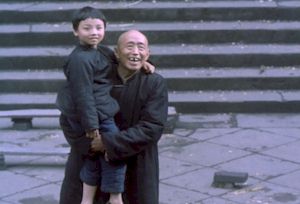

Set in 1930s Sichuan, against the backdrop of numerous child kidnappings for slavery, The King of Masks (1999) is a family-oriented, award-winning film from China. Xu Zhu plays Bianlian Wang, the street performer who is the master of the ancient art of mask making and rapid mask changing (durnig performances). Now old, his wife has left him and his only son has died, so he has no heir to pass on the honored tradition and secret skills.
Living alone on a small boat with only his pet monkey, general, as a companion, he ekes out a meager existence. He dearly wants an heir. One day, Master Liang, the female-impersonator star of the Chinese opera, sees him perform and offers him a position in his troupe, but Wang declines; he prefers to live on his own terms, earning his own money himself.
 A little later, Wang decides to buy an heir, and on the black market purchases a destitute eight-year old "boy" who is affectionately referred to as "Doggie" (the adorable Renying Zhou). Wang is now a "grandpa" and is happy, at least for a while. That is, until he finds out inadvertently that Doggie is a girl, not a boy. At this revelation, he is broken. Tradition says he cannot pass on his trade to a girl. And he has "wasted" his money on a girl. When he asks her why she misled him, she sadly declares, "I was sold seven times. And I was abused. You are the first one to treat me well." Our hearts are broken for her. Though he does not abandon her, no longer is he "grandpa;" now he tells her to call him "boss."
A little later, Wang decides to buy an heir, and on the black market purchases a destitute eight-year old "boy" who is affectionately referred to as "Doggie" (the adorable Renying Zhou). Wang is now a "grandpa" and is happy, at least for a while. That is, until he finds out inadvertently that Doggie is a girl, not a boy. At this revelation, he is broken. Tradition says he cannot pass on his trade to a girl. And he has "wasted" his money on a girl. When he asks her why she misled him, she sadly declares, "I was sold seven times. And I was abused. You are the first one to treat me well." Our hearts are broken for her. Though he does not abandon her, no longer is he "grandpa;" now he tells her to call him "boss."The immediate issue is one of gender discrimination. In context it is clear that boys were prized beyond girls. Girls were not wanted. In some cultures and countries this bias still exists today. And it is ethically wrong. Girls and boys, men and women, all are created equally in the image of God, and are equally loved by God. Though there is clear distinctions between the two genders, their value and worth remain the same. Do we knowingly or unknowingly still discriminate based on gender? Are we biased? Masks challenges us to reflect on these questions.
With Doggie back on the boat as a servant, no longer a "family member" there is little hope for Wang. He continues his work, but his heart is heavy. Then, in a childish accident, Doggie sets the boat ablaze, and Wang loses his beloved masks. Devastated, Wang casts Doggie aside, back to being a street kid. And through some tough circumstances, Wang finds himself arrested convicted on trumped up charges and sentenced to death.
 Doggie, who loves "grandpa" is devastated, but for Wang not the boat or herself, since she is devoted to Wang. With hope dissipating like the morning mist, Doggie goes to beg Master Liang's help. When this fails, she takes matters into her own young hands and throws down her life for the life of her grandpa. Her sacrifice is the salvation that is needed.
Doggie, who loves "grandpa" is devastated, but for Wang not the boat or herself, since she is devoted to Wang. With hope dissipating like the morning mist, Doggie goes to beg Master Liang's help. When this fails, she takes matters into her own young hands and throws down her life for the life of her grandpa. Her sacrifice is the salvation that is needed.The King of Masks contains buddhist teachings such as karma and reincarnation, but at its heart is a message of love and sacrifice, of hope and life tranformed. When Doggie is willing to give up her life to save her grandpa's, she is unintentionally modelling the heart of the gospel. Jesus Christ sacrificed His own life to save those He loved -- you and me. He could have left us to our devices, since we had turned from Him: "For if, when we were God's enemies, we were reconciled to him through the death of his Son, how much more, having been reconciled, shall we be saved through his life!" (Rom 5:10). Instead, His sacrificial death proved Him to be our Savior and gives us hope for transformed lives.
Copyright 2008, Martin Baggs

No comments:
Post a Comment